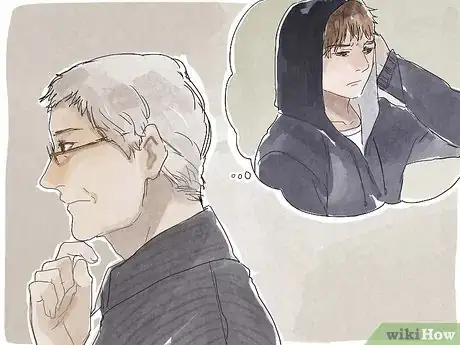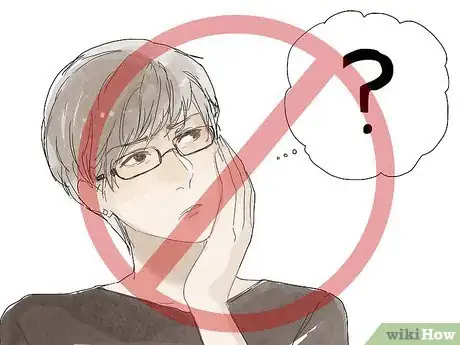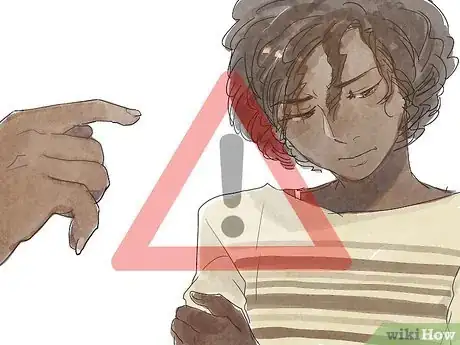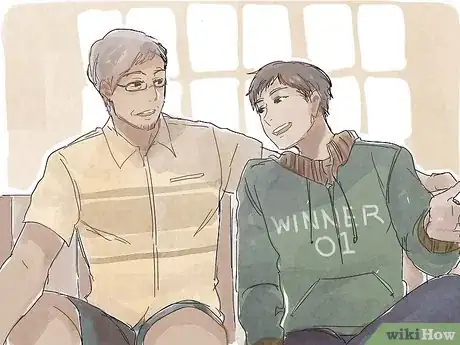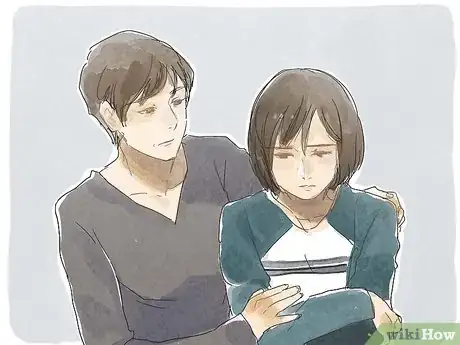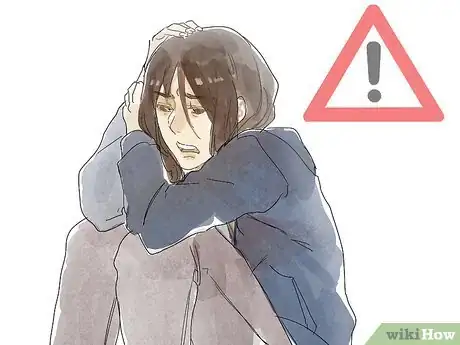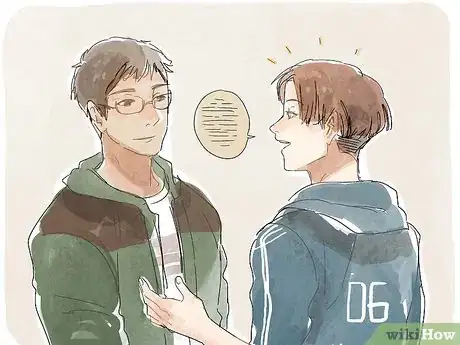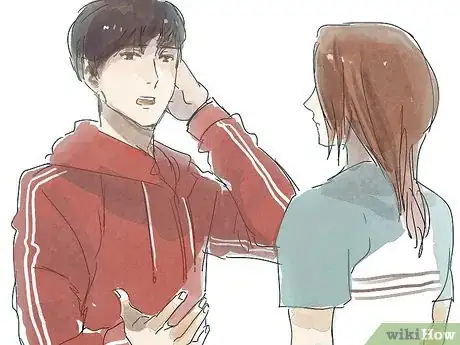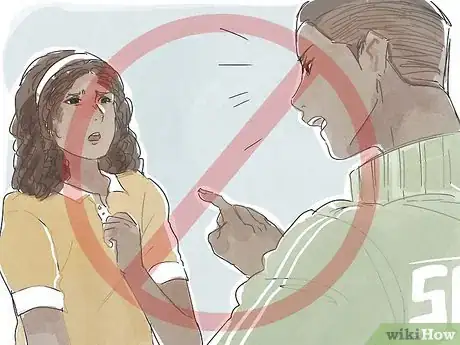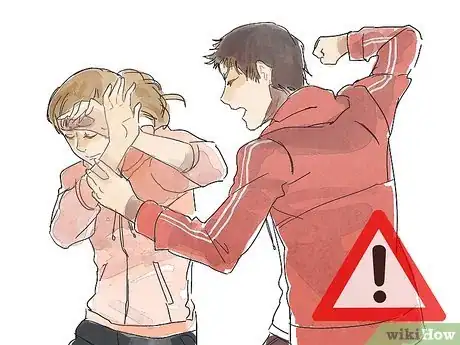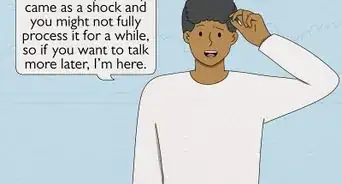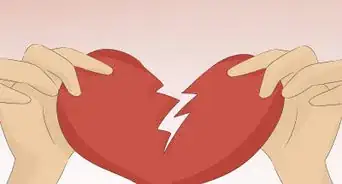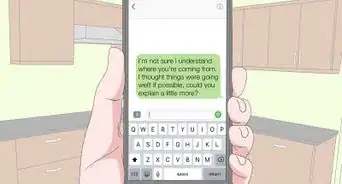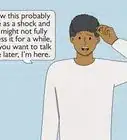This article was co-authored by James M. Sama. James M. Sama is a Personal Development Coach as well as an International Speaker and Author. With over a decade of experience, he specializes in relationships, leadership, and business strategy. James holds a degree in Business Management from Newbury College and a BSBA in Marketing from Suffolk University. In addition to over 38 million page views on his website and a social media following of over 400,000, James has made regular media appearances on CNN, CBS, Bravo, The New York Post, The Huffington Post, and CNBC.
This article has been viewed 20,589 times.
Teenage relationships can be frustrating. Teenage years are a time of rebellion and insecurity, putting a strain on relationships with others. However, active listening, withholding judgment, and being available when needed can all help repair a damaged teen relationship.
Steps
Repairing Parent/Teen Relationships
-
1Recognize patterns of behavior. Teenagers tend to be highly insecure. They dislike feeling like they're being judged for their choices. Instead of laying on the blame when talking to your teen, look for patterns of behavior that are detrimental to a healthy relationship. Combating the patterns is more effective than simply chastising your teen for his or her behavior.
- Try seeing things from your teen's perspective. Why do you think he or she is resistant to having a healthy relationship with you? Where is he or she coming from in regards to the conflict? Is there anything you're doing that's ineffective when it comes to communication?[1]
- Do not worry about who is right. Look for the pattern. What behaviors are creating a negative home environment and how can the two of you work together mutually to address those behaviors? Try beginning a conversation like this: "I notice that I ask you to do put your dirty dishes in the sink. Even when you say you will, you don't end up doing it a lot of the time and I end up having to get on your case. This causes you to get angry. What do you think we can do to solve this problem more effectively?"[2]
-
2Stay in the present. When you're frustrated with a relationship with a family member, you may feel inclined to look back at past interactions. This is a means to collect evidence, with a strong confirmation bias, that you're right and your teen is wrong. Such a strategy can be detrimental when trying to repair a relationship. You're working on moving forward so dwelling in the past is preventing you from moving beyond negativities of the past. When interacting with your teen, focus on the present moment and the present problem.[3]Advertisement
-
3Be available to your teen. You cannot force your teen to want to talk to you. If you try to pry, your teen is likely to pull away. However, if you strive to simply make yourself available your teen will come to you when he or she is in need.
- Always let your teen know if they need you, you can be there to talk. Do not pressure them or make them feel obligated to share. Simply say something like, "If you need me, I'm always here to chat."
- Make sure your teen knows when he or she can reach you when you might not be readily available. Have your work phone number available for emergencies. Text your teen if you can't take a call at a given moment.
-
4Limit judgment. Teenagers are known for their insecurity. If you come off as judgmental to your teenager, this may alienate him or her from you. Try to be as non-judging as possible when talking with your teen.
- People begin to explore new behavior during their teenage years. Sexual feelings emerge and your teen might be curious about exploring aspects of the adult world, like engaging in drinking. Allow your teen to express themselves to you without judgment, but serve as a gentle reminder that safety is important. Do not be afraid to talk to your teen about the dangers of drinking and unprotected sex. Just make sure you do so in a way that makes it clear you want your teen to be safe and happy. Do not frame it in a judgmental tone.
- Try saying something like, "I know teenagers are curious about trying new things, but I want you to be safe and happy. Can we spend some time this week talking about drinking and drug use?"
-
5Focus on making an effort over the ultimate outcome. When trying to repair a damaged relationship at any age, people sometimes get tunnel vision. They feel like they should be hyper focused on potential outcomes. This obsession with meeting goals, which are often difficult to measure in relationships, skews their ability to focus. Place your energy towards putting in a solid effort and goals should happen organically.[4]
-
6Learn how to talk to your teen. Many parents find it difficult to talk with their teen. If you want to build a healthier relationship with your teenagers, learn how to talk to your teen effectively.
- Withhold judgment during conversations but maintain honesty. If certain topics inevitably lead to judgment and hostility, halt the conversation with something like, "I don't think we should talk about this."
- Make time for casual conversation. If you only discuss relationship problems with your teen conversation will always feel stressful and forced. Talk about fun, unimportant matters like movies, TV shows, celebrity gossip, and other fun interests.
- Ease into making conversation with your teen. You can't expect your teen to want to open up and be friends with you over night. Take tiny, gradual steps when it comes to repairing a damaged relationship.
-
7Listen. Parents are sometimes guilty of not truly listening to their teenagers. Having a healthy relationship with your teen means listening to his needs and wants and treating them as valid.
- Practice active listening with your teen. It's important for teens to feel heard and acknowledged. Give non-verbal clues, like nodding and smiling when appropriate, to show you are listening. Repeat back what your teen just said in a brief summary. For example, if your teen is saying he feels like his friends ditched him at the hockey game last week say something like, "So, you're feeling left out because your friends didn't seem to want to spend time with you?" This will show your teen you're paying attention and care.
- Active listening prevents misunderstandings, a factor that can damage any relationship. It also forces you to listen and take in what your teen in saying.
-
8Watch for the warning signs of depression and anxiety in teens. An underlying mental health problem like depression or anxiety could be affecting your relationship with your teen. Such ailments can manifest themselves differently in teens than in adults so familiarize yourself with the warning signs.
- Feelings of sadness, frequent crying bouts, fatigue, loss of interest in activities, and difficulty concentrating serve as symptoms of depression in both teens and adults. There are some symptoms of depression that teens tend to show more often than adults. These include an irritable or angry mood, complaints of various aches and pains, sensitivity to criticism, and withdrawing from friends and family members.[5]
- A teen may act out when experiencing depression and anxiety as a means to cope with emotional pain. He may experience problems at school, academically and behaviorally, and become addicted to going online or abuse drugs and alcohol. Your teen may also develop chronic low self esteem, engage in high risk behaviors, and sometimes lash out at others in violence.[6]
Repairing Relationships Between Teens
-
1Listen actively. If you want to work on repairing a relationship, work on tweaking your listening skills. When someone tries to communicate with you, do your best to show you are listening.
- Actively listening means giving verbal and non verbal cues you are paying attention to what's said. Nod on occasion and say things "Yes" and "Uh-huh." Smile and laugh at appropriate times.[7]
- When it's your turn to speak, take a few moments to reiterate what the other person said. Briefly summarize the points they made, something like "I understand you feel like..." or "I'm hearing you're feeling very..."[8]
-
2Apologize. If a friend or romantic partner feels hurt by something you did, apologize to that person. Teens are often preoccupied with what others think, making them reluctant to apologize. However, whether you feel you were in the wrong or not you should sincerely apologize if you hurt someone's feelings. An apology can go a long way towards repairing a damaged relationship.[9]
-
3Do not judge. Withholding judgment is important to repairing damaged relationships. Try to put whatever circumstances lead to you and this person's disagreement aside. Proceed without judgment, despite any past negativity. Make a conscious effort to see things from the other person's perspective. Even if your feelings were hurt, what do you think drove this person to behave how he or she did?[10]
-
4Identify desirable qualities in friends. Ask yourself whether this relationship is truly worth repairing. Teenagers often make poor decisions relationship wise due to insecurity. Make sure you know the qualities a good friend should have.
- Think about past friendships that were positive as well as your relationships with family members. What did you like about these relationships? Did you feel supported, secure, safe? Did you feel this way in regards to the damaged relationship? Why or why not?[11]
- Look for friends that bring out the best qualities in you. If you don't like how you behave in the presence of a particular person, that friendship might not be worth your time.[12]
- Repair relationships only with those who treat you with respect. Some relationships became damaged for a reason. If you feel disrespected, there is nothing wrong with wanting to end a relationship.[13]
-
5Learn the signs of a damaging relationship. Abusive relationships can take the form of friendships and romantic relationships. Teens are often unaware of healthy relationship dynamics as they're still exploring themselves and the world. Learn what a bad relationship looks like so you know what kind of people to avoid.
- Abusers tend to be very jealous. An abusive friend or boyfriend or girlfriend will get jealous easily and worry about abandonment. Abusers mistrust you when you try to ease their fears and will likely ignore the things you say.[14]
- Abusers often lash out in anger. An abuser might curse at you, yell at you, or blame you for problems over which you have little control. This anger can sometimes turn violent. You should never stay close to someone who harms you physically.[15] [16]
Expert Q&A
-
QuestionHow do you know if it's worth staying in a friendship?
 James M. SamaJames M. Sama is a Personal Development Coach as well as an International Speaker and Author. With over a decade of experience, he specializes in relationships, leadership, and business strategy. James holds a degree in Business Management from Newbury College and a BSBA in Marketing from Suffolk University. In addition to over 38 million page views on his website and a social media following of over 400,000, James has made regular media appearances on CNN, CBS, Bravo, The New York Post, The Huffington Post, and CNBC.
James M. SamaJames M. Sama is a Personal Development Coach as well as an International Speaker and Author. With over a decade of experience, he specializes in relationships, leadership, and business strategy. James holds a degree in Business Management from Newbury College and a BSBA in Marketing from Suffolk University. In addition to over 38 million page views on his website and a social media following of over 400,000, James has made regular media appearances on CNN, CBS, Bravo, The New York Post, The Huffington Post, and CNBC.
Personal Development Coach Think about why you became friends in the first place. What did you like about them? What made you pick them as your friend over everyone else? Then, think about whether you're both still putting in the same effort you did back then.
Think about why you became friends in the first place. What did you like about them? What made you pick them as your friend over everyone else? Then, think about whether you're both still putting in the same effort you did back then.
References
- ↑ https://www.psychologytoday.com/blog/fixing-families/201208/relationship-repair-10-tips-thinking-therapist
- ↑ https://www.psychologytoday.com/blog/fixing-families/201208/relationship-repair-10-tips-thinking-therapist
- ↑ https://www.psychologytoday.com/blog/fixing-families/201208/relationship-repair-10-tips-thinking-therapist
- ↑ https://www.psychologytoday.com/blog/fixing-families/201208/relationship-repair-10-tips-thinking-therapist
- ↑ http://www.helpguide.org/articles/depression/teen-depression-signs-help.htm
- ↑ http://www.helpguide.org/articles/depression/teen-depression-signs-help.htm
- ↑ https://www.psychologytoday.com/blog/hide-and-seek/201207/the-10-golden-rules-communication
- ↑ https://www.psychologytoday.com/blog/hide-and-seek/201207/the-10-golden-rules-communication
- ↑ James M Sama. Personal Development Coach.
- ↑ https://www.psychologytoday.com/blog/hide-and-seek/201207/the-10-golden-rules-communication
- ↑ http://blogs.psychcentral.com/teenagers/2010/12/07/part-iii-developing-satisfactory-peer-relationships/
- ↑ http://blogs.psychcentral.com/teenagers/2010/12/07/part-iii-developing-satisfactory-peer-relationships/
- ↑ http://blogs.psychcentral.com/teenagers/2010/12/07/part-iii-developing-satisfactory-peer-relationships/
- ↑ http://www.pamf.org/teen/abc/unhealthy/dangersigns.html
- ↑ James M Sama. Personal Development Coach.
- ↑ http://www.pamf.org/teen/abc/unhealthy/dangersigns.html
